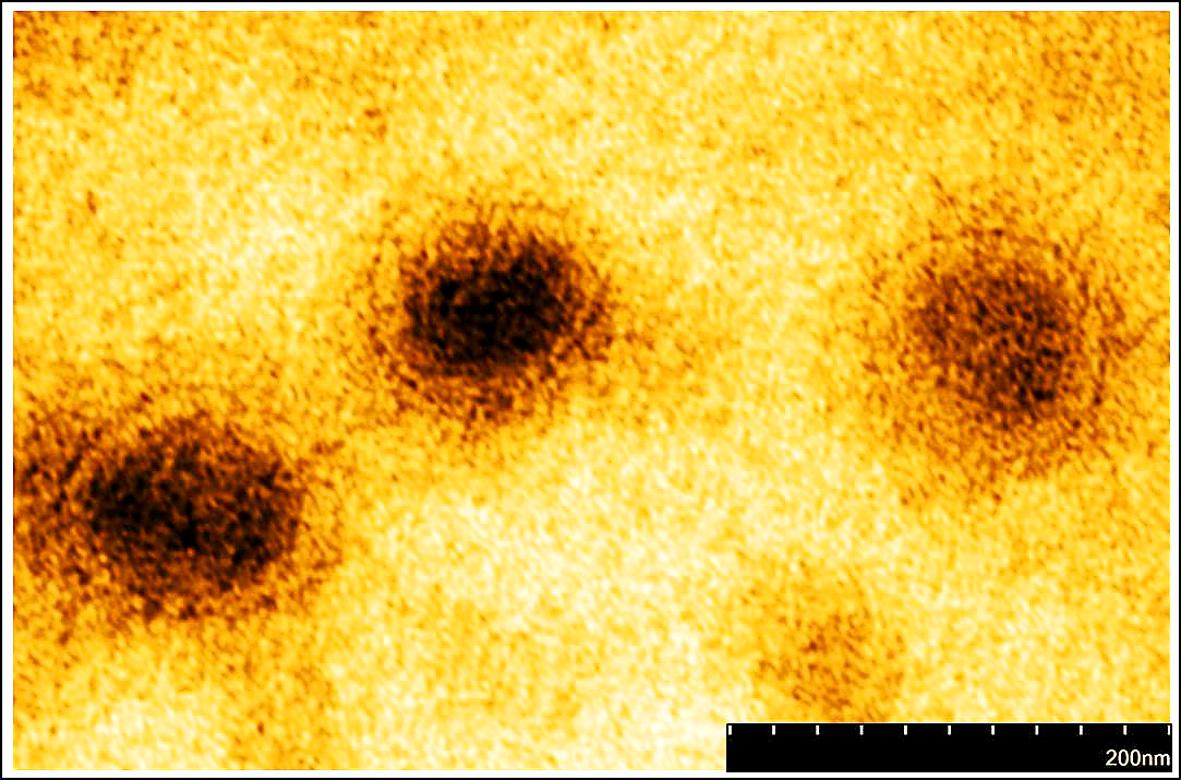Chang Gung Memorial Hospital yesterday said that it has collaborated with other institutes to isolate 22 new strains of SARS-CoV-2 and complete the full genome sequencing of the virus, which causes COVID-19.
A team of researchers has also found 25 strains of antibodies in beta-cells collected from three COVID-19 patients, said Huang Kuan-ying (黃冠穎), a doctor at the Department of Pediatric Infectious Diseases at the hospital’s Linkou branch.
The hospital found that a monoclonal antibody combined with the coronavirus’ spike protein could help inhibit angiotensin converting enzyme-2 (ACE2) and prevent the virus entering the body.

Photo courtesy of Chang Gung Memorial Hospital
ACE2 is an enzyme attached to the membranes of lung, artery, heart, kidney and intestine cells, and is the main entry point for coronaviruses.
Chang Gung University Research Center for Emerging Viral Infections head Shih Shin-ru (施信如) said the antibody could be used to prevent the virus from replicating itself in the human body.
If the antibody proves effective in human trials, it could be used as a treatment for COVID-19 or used in prevention, she said.
The antibody, which originates from the human body, would be much safer to use than antibodies originating from animals, she added.
She suggested that the strains of antibodies be used in permutations for rapid test kits, as it would increase test kit sensitivity and specificity toward SARS-CoV-2.
The hospital also said that it would work with the team to develop a test kit and conduct human trials, adding that it would also reach out to the local pharmaceutical industry to help develop a treatment.
The hospital’s collaborators include Academia Sinica, the National Defense Medical Center’s Graduate Institute of Medical Sciences and a team from the University of Oxford.

US President Donald Trump said "it’s up to" Chinese President Xi Jinping (習近平) what China does on Taiwan, but that he would be "very unhappy" with a change in the "status quo," the New York Times said in an interview published yesterday. Xi "considers it to be a part of China, and that’s up to him what he’s going to be doing," Trump told the newspaper on Wednesday. "But I’ve expressed to him that I would be very unhappy if he did that, and I don’t think he’ll do that," he added. "I hope he doesn’t do that." Trump made the comments in

NOT AN OPENING: Trump’s violation of international law does not affect China’s consideration in attacking Taiwan; Beijing lacks capability, not precedent, an official said Taiwanese officials see the US’ capture of the president of Venezuela as a powerful deterrent to Beijing’s aggression and a timely reminder of the US’ ability to defeat militaries equipped with Chinese-made weapons. The strikes that toppled Venezuelan President Nicolas Maduro signaled to authoritarian leaders, including Chinese President Xi Jinping (習近平), US President Donald Trump’s willingness to use military might for international affairs core to US interests, one senior official in Taipei’s security circle said. That reassured Taiwan, the person said. Taipei has also dismissed the idea that Trump’s apparent violation of international law could embolden Beijing, said the official, who was not

A cold surge advisory was today issued for 18 cities and counties across Taiwan, with temperatures of below 10°C forecast during the day and into tonight, the Central Weather Administration (CWA) said. New Taipei City, Taipei, Taoyuan and Hsinchu, Miaoli and Yilan counties are expected to experience sustained temperatures of 10°C or lower, the CWA said. Temperatures are likely to temporarily drop below 10°C in most other areas, except Taitung, Pingtung, Penghu and Lienchiang (Matsu) counties, CWA data showed. The cold weather is being caused by a strong continental cold air mass, combined with radiative cooling, a process in which heat escapes from

Snow this morning fell on Alishan for the first time in seven years, as a strong continental cold air mass sent temperatures plunging across Taiwan, the Central Weather Administration (CWA) said. The Alishan weather station, located at an elevation of about 2,200m in central Taiwan, recorded snowfall from 8:55am to 9:15am, when the temperature dropped to about 1°C, the CWA said. With increased moisture and low temperatures in the high-altitude Alishan area, the conditions were favorable for snow, CWA forecaster Tsai Yi-chi (蔡伊其) said. The last time snow fell at the Alishan weather station was on Jan. 10, 2018, while graupel fell there